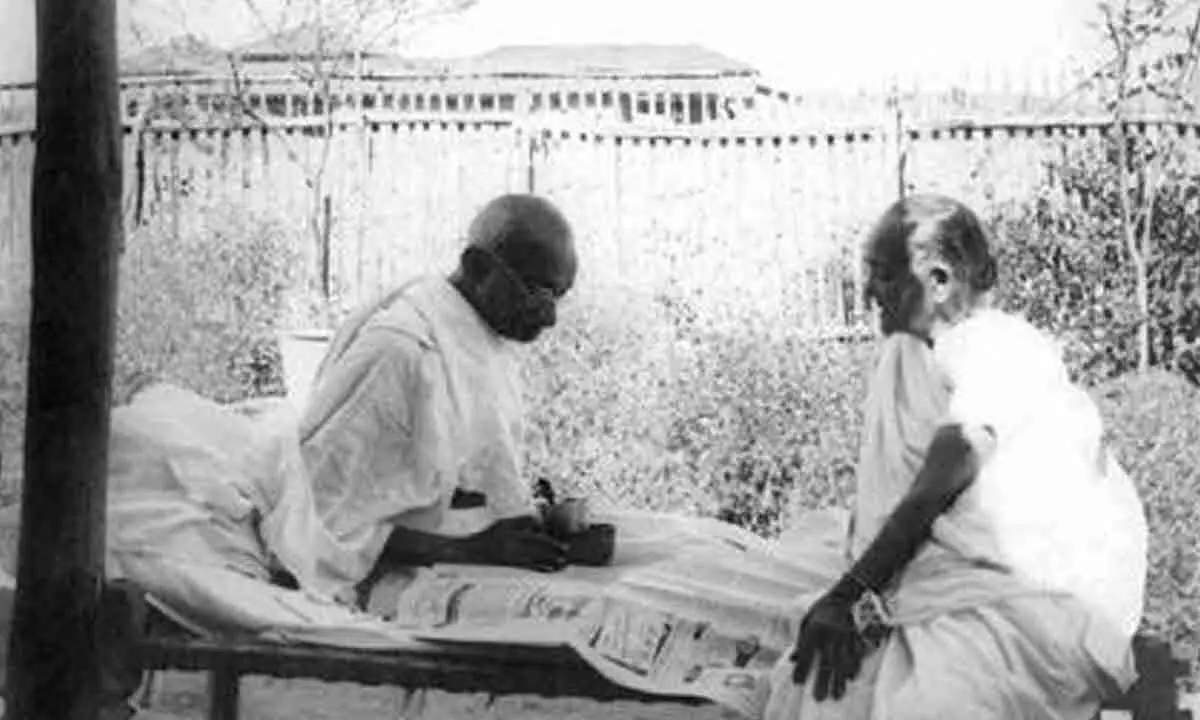Kasturba Gandhi's sole diary brings her voice to the foreground of history

Kasturba Gandhi’s sole diary brings her voice to the foreground of history
A century-and-a-half after her birth, "The Lost Diary of Kastur, My Ba" (HarperCollins) by her great-grandson Tushar Gandhi finally presents Kasturba as her own person, a woman of substance.
A century-and-a-half after her birth, "The Lost Diary of Kastur, My Ba" (HarperCollins) by her great-grandson Tushar Gandhi finally presents Kasturba as her own person, a woman of substance.
Rare photos of Kasturba and Mahatma Gandhi are an added bonus, as the reader gets to hear from Kasturba, in her own words, for the first time, providing through day-to-day activities a peek into what it was like to be married to the Mahatma.
It surfaced a couple of years ago when the staff of the Gandhi Research Foundation in Jalgaon found a deteriorating and damaged diary at the Kasturba Ashram, Indore.
It turned out to be a 135-page diary written by Kasturba Gandhi, from January to September 1933. Somewhat like Kasturba, her diary lay forgotten and neglected. This book is a reproduction of the diary, accompanied by a transcription of what she wrote in Gujarati, along with an English translation by Tushar Gandhi.
All her life, Kasturba was considered uneducated. Initially, when Tushar Gandhi spoke about the diary to family members, they refused to believe that there could be such a thing, the common refrain being: "She was illiterate. She could not write."
As Tushar Gandhi read Kasturba's diary, this assumption was dispelled. It provided a glimpse into who she was - an individual, a companion and a Satyagrahi in her own right.
Here was a woman who was witnessing history being made, observing and understanding the process and participating in it, too. It also tells of her two imprisonments that year, not because she was Bapu's spouse but because she was offering satyagraha herself.
"Kasturba was unlettered. She could not write. All her life and post her death Kastur was always dismissed as being uneducated and unable to comprehend the written word. This book is testament to Kastur Gandhi nee Kapadia dispelling the notion in the form of a well-articulated daily diary. Most of her writing is from the time she was a satyagrahi imprisoned by the colonial government for her individual acts of defiance, showing us her world not only as Gandhi's shadow, but her own person, in her own words," Tushar Gandhi said.
Swati Chopra, Executive Editor, HarperCollins India, said: "Kasturba Gandhi has always been known as the Mahatma's wife, spouse to a man who towered over contemporary India's history. Though narratives about Mahatma Gandhi have spoken of her, we have never before heard her speak, in her own voice. This book is perhaps the only -such opportunity we will have, given that it is based on a diary she wrote, possibly the only one she ever did."
"Lost for years, it was serendipitously discovered by her great-grandson, Tushar Gandhi. The book encapsulates the diary pages, written in her own hand, alongside the original Gujarati text and an English translation and contextualisation. It includes rare photos of Kasturba and Mahatma Gandhi, and is sure to delight readers everywhere," Chopra added.
Tushar Gandhi is the grandson of Kasturba and Mahatma Gandhi's second son Manilal and daughter-in-law Sushila, and son of Sunanda and Arun Gandhi. He is the founder-president of the Mahatma Gandhi Foundation, president of the Lok Seva Trust and director of the Gandhi Research Foundation, Jalgaon.
His first book, "Let's Kill Gandhi!", was published in 2007, with a revised edition in 2021.
Tushar Gandhi has dedicated his life to preserving, celebrating and keeping alive the legacy he was born into. In 1996, when he discovered an urn containing Mahatma Gandhi's ashes lying forgotten in a bank vault in Odisha, he obtained an order from the Supreme Court and immersed the ashes at the Triveni Sangam at Allahabad on January 30, 1997. In 2005, on the seventy-fifth anniversary of the historic Dandi March, Tushar Gandhi walked the 387-km path from Sabarmati Ashram to Dandi; this resulted in Prime Minister Manmohan Singh declaring the entire path as India's first historic heritage route. Tushar Gandhi continues to write and speak for all those still struggling for their fundamental human rights. He lives in Mumbai with his wife Sonal, son Vivan and daughter Kasturi, who is named after her great-great-grandmother.

